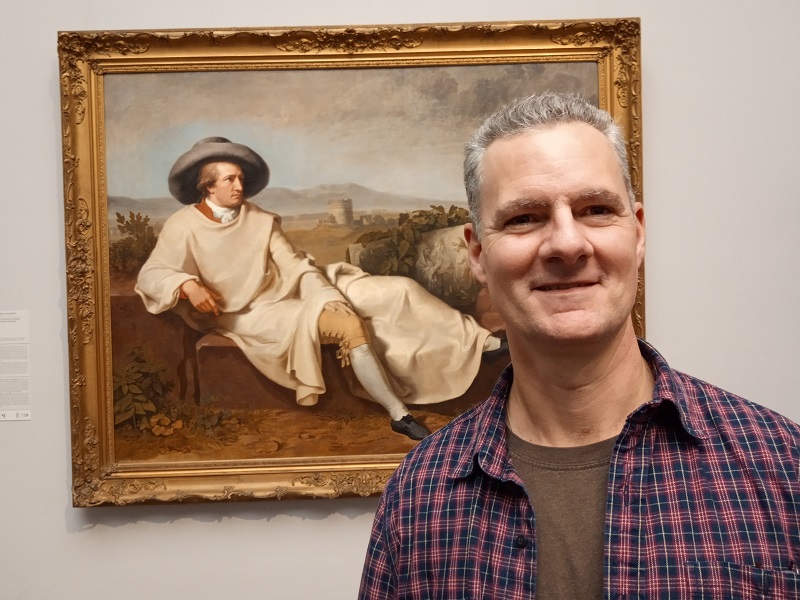This story first appeared in Shippensburg University Magazine.
Knowledge and education. These are the keys, said Dr. David Wildermuth, associate professor of German, to understanding the root causes of war and conflict, with the hope for ending world violence.
Wildermuth is on a year-long sabbatical in Germany, researching material for the book Ordinary Soldiers? A Case Study of the Nazi-Soviet War of Annihilation.
He received a grant from The Harry Frank Guggenheim Foundation to complete the study. The foundation awards grants to support scientific research on the causes and control of violence and aggression in the modern world.
Often described as a “war of annihilation,” the Nazi-Soviet War (1941-1945) was an effort by Nazi Germany to destroy the former Soviet Union and take control of its food, oil, and other natural resources. “The war is today largely understood as the most brutal of all wars fought between two modern, industrialized states,” Wildermuth said.
His study focuses on the German Army’s 35th Infantry Division, deployed without pause on the Eastern Front from 1941 until its surrender in 1945. Specifically, he is researching the “ordinary men” who fought this war, and the lack of controls of extreme violence against the enemy.
“One surprising fact I’ve learned is the extent to which the division had become dependent on ‘the enemy,’ that is the Soviet civilian population and prisoners-of-war, to maintain its ability to fight.”
The German Army entered the campaign with instructions to “live off the land,” thereby minimizing wartime sacrifices of the German homefront. But, the army faced difficult terrain, harsh winters, and immobilizing shortages of food and men.
“Both Soviet prisoners-of-war and civilians were regularly forcibly drafted into the German war effort,” Wildermuth said. “Clearing roads of snow, building defensive fortifications, and burying the dead were some of the main tasks.”
This hard labor was generally performed by old men, women, and children. For many, it was the only way to access minimal rations of food.
Wildermuth uses his fluency in both German and Russian to find and study. sources that have long been neglected by other historians. He intentionally sought both German and Soviet sources of information to provide a more balanced historical account. Previous research has relied heavily on the more available German records.
His research has taken him to remote corners of Russia and Belarus to gather eyewitness accounts from Soviet civilians who had contact with the 35th. He also has scoured the extensive German military archive, including numerous letters from the front written by members of the 35th.
According to Wildermuth, the soldiers wrote about both the mundane and horrific things they had seen and experienced. The lack of food was a common theme. The lack of food was a common theme. Another theme is the effect that the war, even in its early years, was having on them. In the words of one soldier, “…this battle is hard and savage. Everyone here, according to his nature, has been transformed into another person.” The letter was dated March 1942.
Nonetheless, it is clear to Wildermuth based on his research that most German soldiers believed in the righteousness of their cause, and their ultimate victory.
“Questions such as how different societies have constructed and dehumanized the ‘other’ have long fascinated me,” Wildermuth said. “This is often a necessary step on the path to war. Nazi Germany is the best-known example, first dehumanizing and then exterminating the ‘other,’ European Jewry.”
Although the global pandemic has impacted his ability to travel, Wildermuth continues to write while in Germany. He will complete his research when he returns to the US.
He seeks to provide more than a historical account in his book. “Through this case study, I continue to think about how states can better strategize for more peaceful outcomes.”


